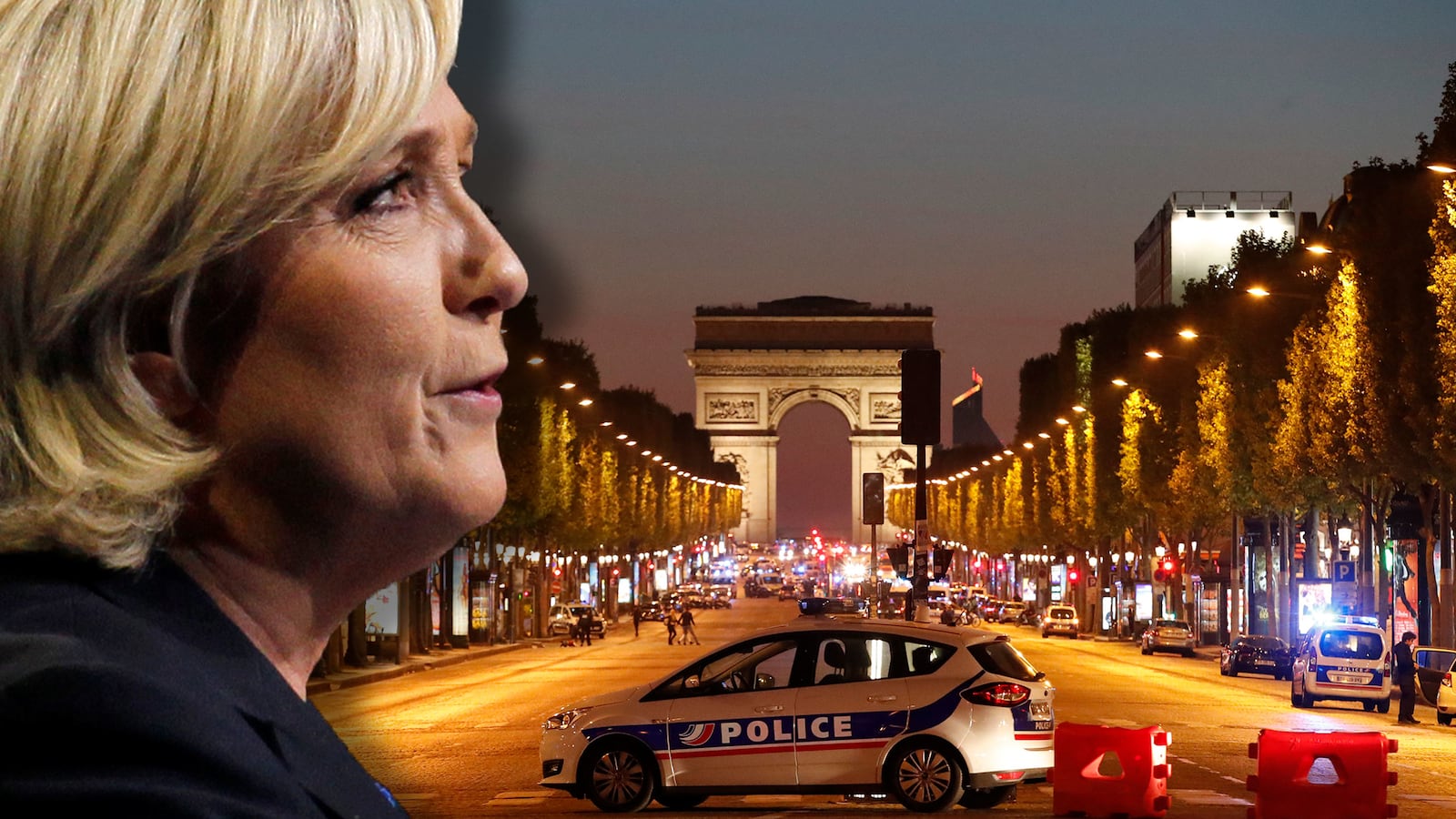PARIS—The scene of the crime was well chosen: the most famous boulevard in Paris, the Champs-Élysées, the prestigious address of Cartier and Louis Vuitton, the Lido nightclub, even the Disney store. On a balmy Thursday night, it was mobbed with tourists shopping and strolling. But they were not the target of the man who stepped out of a car and opened fire with an automatic weapon. He was shooting at police, and shooting to kill.
In a terrifying exchange of gunfire, one policeman lost his life, two were wounded, a passer-by was wounded, and the shooter was “neutralized,” as the authorities put it. The entire area was shut down by authorities, with well-armed soldiers stationed at the top of the boulevard in front of the Arc de Triomphe, even as the lights on the Eiffel Tower twinkled in the background to mark the top of the hour. Puzzled tourists lingered outside the crime scene tape, some excitedly telling their stories on their phones’ live-streaming aps.
Tragic and horrifying as the incident was, the question that looms in the days and hours ahead is how it will affect presidential elections that could change the history of France, of Europe, and of NATO, the most important of America’s international alliances.
“It is going to be a big thing,” says Gilles Kepel, author of Terror in France: The Rise of Jihad in the West,”because the big question is how much it will boost Marine Le Pen.”
The leader of the far-right National Front, who is anti-immigrant, anti-European Union, pro-Russian, anti-American, and pro-Trump, has been the leader in the polls going into the first round of the presidential elections on Sunday among a field of 11 candidates. Conventional wisdom and most polls have raised the expectation that in the run-off two weeks later her extremism would be rejected by a massive majority of the voters. But that is far from certain in the wake of a highly publicized terrorist incident.
As Kepel and others have pointed out, based on the ideological writings of jihadists such as Abu Musab al-Suri, the terrorists' goal is to create violent divisions in Europe’s population, pitting Christians—“crusaders”—against Muslim immigrants and their descendants, to the point where eventually there is civil war.
In that context, from the jihadist point of view, a Le Pen victory is something devoutly to be wished. And the terrorist incident that could be the tipping point was all too easy to execute.
The attacker drove up beside one of the many police vehicles patrolling the Champs Élysées, got out and started firing with an assault rifle, according to French officials, before other police on the scene shot him dead. Typically the great tourist venues of Paris are patrolled by soldiers in full battle gear armed with FAS automatic rifles, as the result of a string of terrorist attacks. The include the Charlie Hebdo and kosher supermarket killings in January 2015, and a coordinated attack on the Bataclan concet hall, a sports stadium, and sidewalk cafes in November the same year, which killed 130 people. Last July, a man in Nice, on the Mediterranean Coast, used a heavy truck to kill 86 people and injure more than 400 during Bastille Day celebrations.
The gunman on the Champs Élysées Thursday night was identified by French authorities as a French citizen, 39 years old, from a suburb east of Paris, who was known to intelligence services. He reportedly had been imprisoned before for attacking police officers, but details have been closely held as searches are carried out for evidence of possible accomplices.
The so-called Islamic State claimed credit for the attack, naming the shooter as Abu Yusuf al-Beljiki, suggesting that ISIS, at least, thought he was Belgian, and heightening suspicions more than one jihadist may have been involved.
Although less widely reported than some of the other atrocities with huge death tolls, the targeting of police officers and soldiers has become a recurrent feature of jihadist attacks in France, where just a month ago a deranged 39-year-old Ziyed Ben Belgacem, drunk and on drugs, was killed after holding a gun to a female soldier’s head at Orly Airport.
The attack at Orly followed an incident in February, when a machete-wielding man attacked soldiers on patrol at the Louvre before they shot him dead.
And last July, less than a year after the terror attacks on bars and a concert hall in Paris, Larossi Abballa, who claimed allegiance to the so-called Islamic State, murdered a senior police officer and his partner, who was also with the police, in front of their 3-year-old son in Magnanville, west of Paris. Abballa the described his crime in detail on Facebook Live before armed police arrived on the scene and killed him.
While most people in France associate terrorist Amedy Coulibaly with the horrific attack on a kosher supermarket in January 2015 shortly after the Charlie Hebdo murders, Coulibaly’s first victim was a female police officer whom he gunned down in Montrouge, south of Paris.
In 2012, in a killing spree in southern France a lone gunman named Mohammed Merah murdered three French soldiers, two of whom were Muslims, before attacking a Jewish school where three children were among his victims. Eventually Merah was cornered and killed, and for some time the incident was regarded as an isolated atrocity. But Kepel and others now cite it as the beginning of the resurgence of jihadist terrorism in France. In the 1980s and early 1990s there had been a series of assassinations and attacks backed by Iran, or carried out by Sunni radicals connected to a failed revolution in Algeria, a former French colony. After years of quiet, Kepel says, the French services had grown complacent. But that clearly is not the case anymore.
The latest shooting comes a day after police arrested two young men on suspicion of planning a terror attack.
They were detained in the southern port city of Marseille, where a subsequent search of an apartment yielded three kilos of explosives, several guns, and an ISIS flag. As with most of the other terrorists killed or apprehended in Europe in recent years, the two had been imprisoned previously. One of them, a French citizen named Clément Baur, had claimed to be a Chechen jihadist, and is believed to have radicalized his former cellmate, 29-year-old Mahiedine Merabet, who was in jail for various petty criminal offensives. Both are now in custody.
“They were aiming to commit in the very short term, in other words in the next few days, an attack on French soil,” Interior Minister Matthias Fekl said Wednesday. Certainly their arsenal suggests the ferocity of their intent.
Even before the Champs-Élysées attack Thursday night, the Marseille arrests had put the country on edge and heightened fears that extremists could target the election in the final days of the campaign or during Sunday’s vote.
François Fillon, the candidate for the conservative Les Républicains and author of Defeating Islamic Totalitarianism, said he would cancel the campaign events he had had been planning for Friday as a result of the shooting. The other major candidates, including Marine Le Pen, followed suit.
The Champs-Elysées remained locked down late on Thursday night and metro stations in the area were also closed. The normally vibrant thoroughfare and tourist attraction was eerily empty, save for police cars and law enforcement officials. A helicopter hovered low above the avenue.






